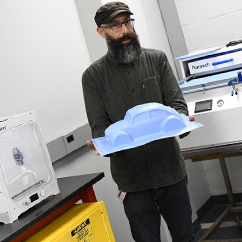IDEAS—short for Integrated Design, Engineering, Arts & Society—is a dynamic interdisciplinary program focused on the creative intersection of those three fields. Hosted and administered by the College of Design and Engineering Studies (CoDES), IDEAS draws from such varied fields as digital design, the arts, architecture, geology, biology, and physics. Students can pursue an IDEAS minor or linked major. A engineering dual degree program is also offered.
From the outset, IDEAS students develop a sophisticated understanding of the making and designing process through hands-on, collaborative, project-based work. It’s an intentional departure from traditional engineering training, with practical experiences unfolding at the same time as theoretical learning.
The skills developed through this linked major and minor can be applied in countless settings—from design studios to science labs, from architectural firms to tech startups.
What You'll Study
The Integrated Design, Engineering, Arts & Society (IDEAS) linked major challenges students to think broadly, make responsibly, and respond critically to the complex social, technological, cultural, and environmental conditions that surround them.
- Hands-on, collaborative, project-based courses form the core of the major.
- Students will complete courses across all three academic divisions before establishing an area of focus.
- The IDEAS major culminates with a supervised capstone project.
Because IDEAS is a linked major, students must complete all the requirements for graduation from their primary major in addition to those of the IDEAS linked major. Each student will work closely with an IDEAS advisor to develop an individual course of study within an established major track.
Minor Requirements
A minor in IDEAS requires seven credits. Comprised of three courses, the IDEAS minor core is designed to introduce students to hands-on project-based studio, laboratory, and critical coursework in design and engineering. The remaining four elective courses come from course concentrations. Some courses offered on an irregular basis are not listed in concentrations, but may be used for electives subject to approval from the minor advisor. Students should complete at least one course from the required core courses to be admitted to the IDEAS minor.



